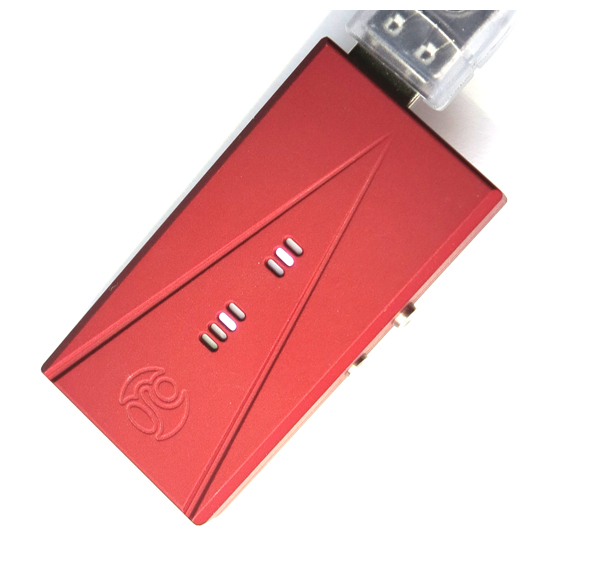Light Harmonic Geek Out 1000 DAC and Headphone Amplifier
 Building on their momentum of successful Kickstarter and Indiegogo campaigns, Light Harmonic added to their Geek Out line of products: the remarkable Geek Out 1000, designed to drive larger headphones. Those seeking a similar DAC/amp device designed to support in-ear monitors should check out the Geek Out 720 or other products in the Geek Out lineup.
Building on their momentum of successful Kickstarter and Indiegogo campaigns, Light Harmonic added to their Geek Out line of products: the remarkable Geek Out 1000, designed to drive larger headphones. Those seeking a similar DAC/amp device designed to support in-ear monitors should check out the Geek Out 720 or other products in the Geek Out lineup.
For such a tiny device, Geek 1000 offers substantial prowess for anyone exporting files from his or her computer using a USB 2.0 port. Light Harmonic includes with the Geek Out a 6-inch USB cable – and the computer’s USB port powers the device – so you are ready to rock as soon as you open the box. The sound continues to improve after many hours of break-in.
What makes the Geek Out special? First, the tiny one-watt Class A amplifier nestled within the beautifully anodized aluminum frame puts out plenty of juice to power larger headphones like my Sennheiser HD-650 and Audeze LCD-X. It’s important to heed Light Harmonic’s warning to turn down the volume when starting a listening session. They are not kidding here, as this little gizmo is capable of driving headphones to piercing levels. Given the tiny 2.5” x 1.25” x 0.3” dimensions of the Geek Out, there is only room for 3.5mm output jacks. For cans equipped with ¼” plugs, an adapter is required. Dual jacks offer the ability to load 47 or .47 ohms.
Second, the built-in DAC supports digital audio files across the resolution spectrum, all the way up to 32-bit/384 kHz and DSD 128. Light Harmonic’s philosophy of design does not include up-sampling capability. They feel the best sound comes from the decoding of native digital files. Tiny LED lights on the Geek Out provide an indicator of file resolution. While most of the lights are white, a satisfying blue LED indicates the throughput of a DSD file. As you might expect, the better the file quality, the better the sound – so break loose those high-resolution files and give the Geek the digital bits it deserves.
With the DAC and amplification capabilities working in tandem, sound though the Geek Out proves shockingly good. Immediately after starting the music do I find myself bathed in opulent sound. In headphone listening sessions through both my Mac Mini and Windows-based laptop using iTunes or JRiver Media Center 20, the Geek Out indeed eeks out tuneful detail in bass, mids and highs. The sound is very smooth without the stridency that can sometimes accompany high frequency information. Bass is very deep and punchy, and smooth vocals project forward in the stereo image.
Geek Out 1000’s volume is controlled by up-and-down buttons on the side of the unit. Pushing both of the buttons at the same time puts the Geek Out into what Light Harmonic dubs “3D Awesomification” mode. This setting projects the stereo image forward a bit rather than portraying it in a virtual plane directly between the ears. A second blue LED indicates the activation of this sound mode – and it is fun to experiment with the 3D option.
If you do not listen to headphones all the time, the aforementioned .47ohm output gives the Geek Out ability to connect with your full-sized stereo preamplifer or integrated amp via a 3.5mm to RCA stereo adapter cable. I had to give this a try using the Geek Out’s USB adapter to export from a Mac Mini, and a Jena Labs adapter cable to connect the Geek’s output to my reference system.
Looking at the tiny Geek Out, which is so small and light that connected audio cables leave it suspended in mid-air, its appearance versus my larger and heavier reference components is almost cartoonish. I flash back to childhood images of Popeye’s stick-figured girlfriend, Olive Oyl, suspended in a hammock. Instead of resting though, imagine tiny and delicate Olive Oyl joining a herculean professional football team and scoring a touchdown.
I preset my mental expectations on par with the sonics I’d expect from a $300 DAC and hit the play button. Well, I found my jaw hanging after the first few notes. This little marvel puts out fantastic sound, especially when using native DSD or jRiver Media Center to upsample CD-level files to DSD.
Unfairly comparing Geek to reference DACs many times its price, like Light Harmonic’s own DaVinci DAC, more money does buy a user more refined sound with additional detail, air, and nuance. For a mere $300 though, Geek does an amazing job holding its own among highly resolving components in the audio chain, and it pushes upward the conceptual apex of price-performance.
It’s easy to recommend the Geek Out 1000. Whether you use it to drive larger headphones, or just use it as a DAC, your computer-based audio system may have found a new, budget-conscious best friend. -Rob Johnson
Light Harmonic Geek Out 1000
MSRP: $299



